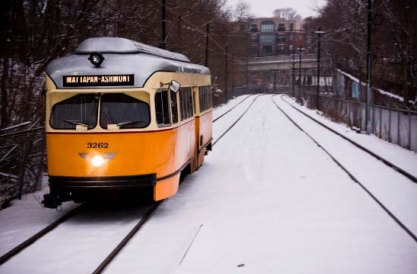December 31, 2018


Cullinane presses Gov. Baker, MBTA for update
Findings in the long-awaited report on the future prospects of the Mattapan Trolley Line report assert that problems associated with the Red Line extension extend well beyond the status of the 75-year-old trolleys, according to a story published online by Commonwealth Magazine on Sunday.
The article by Colman Herman, a contributor to the magazine, cites a consultant’s study, which was first expected to be released last winter, as laying out in detail the infrastructure issues involved in rehabilitating the high-speed line: Various elements, including tracks, stations, bridges, signals, switches, and the maintenance facility, were ranked marginal or poor 41 times; fair, moderate, or functional 48 times; good 47 times; and excellent only 5 times, the report notes, adding that “immediate attention” is required to address deteriorating rail ties on two bridges along the Mattapan line – the Gallivan Boulevard bridge and the Medway Street overhead bridge.
According to Herman’s report, the $1.1 million study, by CH2M, said the Gallivan bridge’s wooden rail ties are in poor condition and need to be replaced to “ensure safe operations,” and the bridges themselves suffer from cracks, deteriorating masonry, and paint issues.
The magazine’s scoop moved state Rep. Dan Cullinane, who has made the status and future of the line an integral issue for his office, to publish a statement to state and local officials noting that he had sent a letter “to Governor Baker last week expressing frustration over the silence and lack of details surrounding the several times delayed Mattapan Trolley study.”
“My ask was simple - have the MBTA leadership meet with all of us as a delegation for an honest conversation about what is in the report and why the delays and then have MBTA leadership host a meeting with the community for the same honest dialogue. … considering the holidays I did not expect to hear back until after the new year.”
Given that, he said, he was “shocked and disappointed that somehow Commonwealth Magazine got the report and ran an article outlining what was contained in the MBTA commission report without so much as a phone call or email from the MBTA or the Administration “to his office.”
Cullinane added, “I look forward to continuing to work with each of you to preserve the Mattapan Trolley Line and to work with the MBTA to explore all possible solutions of saving the line with trolleys (they can be new trolleys with an historic outer shell if need be) as the service vehicles serving this route. This is an issue of transit equity for those served by this line and an issue about choosing to preserve history in our communities.”
The consultant’s report noted that the trolley maintenance facility, a barn-like structure that is open to the elements at both ends, is “barely marginal” for its intended use of servicing an aging fleet, the magazine reported, adding that the “limited and exposed maintenance area . . . makes large-scale fleet improvement efforts and internal modification programs extremely difficult, costly, and inefficient.”
The study also indicates compliance with the Americans with Disabilities Act is often marginal at the line’s eight stations, Herman noted, with access particularly problematic at Ashmont Station.
Herman wrote that the report, obtained under a public records request and follow-up appeal, sheds little light on the feasibility of various options or their cost because sections dealing with current needs, possible improvements, and capital programs were redacted.
He also noted that because the assessment of the infrastructure done by CH2M was based solely on visual observation, the consultant recommends that the T consider doing a “full bridge and structures assessment . . . that would include a detailed structure and foundation review and an underwater assessment of bridges along the Neponset River.”
In a Dec. 18 letter to Gov. Baker, Cullinane noted that the MBTA had convened a series of public meetings on the status of the trolley line in spring 2017. But, he noted that “there have not been any follow-up informational community meetings or any proactive meetings with the delegation of elected officials who represent the communities the Mattapan Trolley Line serves to inform us, and or our constituents, of the status of the upgrades to the trolley line or of the findings of the MBTA’s study.
Cullinane pressed Baker to direct MBTA leadership to brief him and other elected officials and to commit to the T “host an informational public meeting to do the same.”
A Reporter inquiry to MBTA officials regarding Cullinane's concerns remains pending at this hour.
-Developing story-
Topics:


